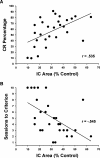Inferior colliculus lesions impair eyeblink conditioning in rats
- PMID: 18086827
- PMCID: PMC2151021
- DOI: 10.1101/lm.716107
Inferior colliculus lesions impair eyeblink conditioning in rats
Abstract
The neural plasticity necessary for acquisition and retention of eyeblink conditioning has been localized to the cerebellum. However, the sources of sensory input to the cerebellum that are necessary for establishing learning-related plasticity have not been identified completely. The inferior colliculus may be a source of sensory input to the cerebellum through its projection to the medial auditory thalamus. The medial auditory thalamus is necessary for eyeblink conditioning in rats and projects to the lateral pontine nuclei, which then project to the cerebellar nuclei and cortex. The current experiment examined the role of the inferior colliculus in auditory eyeblink conditioning. Rats were given bilateral or unilateral (contralateral to the conditioned eye) lesions of the inferior colliculus prior to 10 d of delay eyeblink conditioning with a tone CS. Rats with bilateral or unilateral lesions showed equivalently impaired acquisition. The extent of damage to the contralateral inferior colliculus correlated with several measures of conditioning. The findings indicate that the contralateral inferior colliculus provides auditory input to the cerebellum that is necessary for eyeblink conditioning.
Figures




References
-
- Aitkin L.M., Webster W.R., Veale J.L., Crosby D.C. Inferior colliculus. I. Comparison of response properties of neurons in central, pericentral, and external nuclei of adult cat. J. Neurophysiol. 1975;38:1196–1207. - PubMed
-
- Bao S., Chen L., Thompson R.F. Learning- and cerebellum-dependent neuronal activity in the lateral pontine nucleus. Behav. Neurosci. 2000;114:254–261. - PubMed
Publication types
MeSH terms
Grants and funding
LinkOut - more resources
Full Text Sources
